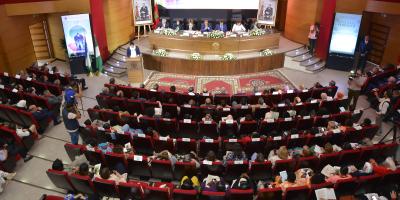
“Women’s participation is not simply ‘the right thing to do’. It can also lead to better justice outcomes and experiences,” stated IDLO’s Director of Programs Erwin van der Borght at the opening of the Regional Symposium of African Women Judges held in Fes, Morocco on October 10, 2019.
Co-hosted by IDLO, the symposium was organized by the Supreme Judicial Council of Morocco, Union of Moroccan Women Judges and International Association of Women Judges and convened judges from across the continent. IDLO supported the participation of judges from Kenya, Somalia, Tunisia and Uganda.
Kicking off on Morocco’s National Women’s Day, the three-day forum focused on the unique challenges faced by women judges, the significance of their role in the justice sector and how their participation affects justice for all.
Many countries across the globe continue to see women underrepresented in the judiciary. However, having women on the bench presents clear advantages to justice systems. Gender parity can enhance the legitimacy of justice institutions, strengthen equality of opportunity for women, and improve justice outcomes and women’s justice experiences.
“If we don’t create some form of parity in the way in which we have judicial officers across the justice system, we will find that at the end of the day, women will be left behind,” remarked Lady Justice Agnes Murgor of Kenya’s Court of Appeal, who is also President of the Kenya Chapter of the International Association of Women Judges.
Research by IDLO illustrates that strengthening women’s participation in the justice sector can break down barriers to women’s access to justice, a viewpoint echoed by women judges during the symposium.
“When you have women within the justice system, they see things from a different perspective,” continued Lady Justice Murgor. “We are also able to empower women in society to ensure they will be confident that, should they come to the courts, their issues will be addressed according to the rule of law.”
To remedy a lack of parity within judiciaries, countries have taken myriad approaches to improving women’s participation, including through legal mandates.
“Legal provisions should be written as an obligation, not as an aspiration. Wording of constitutional requirements on gender balance is important to ensuring that quotas have an effect on the upper echelons of the court system,” continued Mr. van der Borght.
At the same time, even with the strongest legal frameworks, non-legal barriers also effectively exclude women. Some of these barriers are outlined in IDLO’s newest publication, Women’s Professional Participation in Tunisia’s Justice System: Pathways and Opportunities, which examines women’s role in the judiciary through the country lens.
The report emphasizes that, in order to get a complete picture of gender parity in the judiciary, systems should look beyond tallying up sheer numbers and quotas, but rather understand the quality of positions and influence of women as decision makers.
“Today we have a respectable number of women in the justice system, around 40 per cent or more. But in decision making positions our presence is weak,” stated Justice Nejat Ben Salah, Judge and Advisor to the Minister of Justice in Tunisia.
A key consensus emerging from the symposium was the notion that ensuring women’s participation in the justice sector yields benefits for all. It is not just a matter of principle and equal rights between men and women, but crucial to the success of a society.
“The presence of women is very important in the justice system as actors – and factors – of peace and security,” continued Justice Ben Salah. She concluded that women judges represent a “guarantee for our continent – for development, for peace and for security; because there is no development without security and justice”.
At the 67th session of the United Nations General Assembly in 2012, IDLO pledged to “undertake a global survey of the role of women in justice sector institutions and to analyze the legal barriers to women’s access to justice”. The pledge demonstrates IDLO’s commitment to gender equality by amplifying women’s voices, leadership and participation in justice institutions. Since then, IDLO has produced a series of reports that ultimately aim to encourage national governments and the international community to address the unique needs and challenges faced by women legal professionals and advance access to justice for all.
Photo credit: Supreme Judicial Council of Morocco

